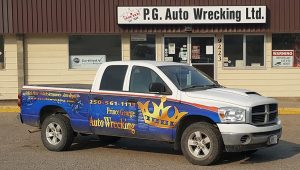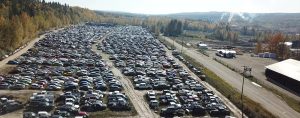
Prince George Auto Wrecking truck
PRINCE GEORGE – Prince George Auto Wrecking Ltd. is in the recycling business.
Established in 1940, the family business at 9223 Northern Crescent at the south end of the BCR Industrial site is well known as a place that offers used parts for most models of cars, trucks and SUV’s. They also sell used vehicles, so what the operation really does is recycle.
The automobile is the most recycled consumer product in the world today, and about 95 percent of retired autos are processed for recycling each year: Everything from floor mats and instrument panels to upholstery, aluminum and steel can be recycled for use in a new automobile or another consumer product. Recyclers provide consumers, with low-cost, high-quality used auto parts using modern business practices and very strict environmental regulations.
General Manager Ryan Muxlow says there is something recyclable on every vehicle.
“Some are definitely worth less than others, but there is always some sort of recoverable value on pretty much everything that is brought in here,” he says.
Prince George Auto Wrecking is a member of the Automotive Retailers Association and AREA Environmental Certification Program. They have an average of 20 employees depending on the season, who do everything from inventory to dismantlers and licensed mechanics.
“We do mechanic work on site,” Muxlow notes. “We are a licensed automotive dealership, and we do sell vehicles. We do not do trade-ins or consignments, though.”
Vehicles arrive at Prince George Auto Wrecking several different ways. They do purchase and tow some of them, and other vehicles that are drivable are brought in by customers.

An overhead view of Prince George Auto Wrecking’s lot at the south end of the BCR Industrial Site
Each vehicle goes through a rigorous process designed to maximize the amount of material that can be reclaimed and to minimize environmental impact. The vehicles that some are driving today will be a source of numerous recyclable materials tomorrow.
Vehicle parts offer recycling opportunities for materials such as steel, aluminum, plastics, antifreeze, and batteries, as well as whole parts such as tires, seats, engines, and alternators.
Car batteries are recycled correctly, which means that the sulfuric acid can be cleaned and reused in a new battery or other useful products. Batteries contain up to 21 pounds of lead, which can be salvaged and reused. Plastic from batteries are also reused, but not typically in batteries again.
Oil, gas, and operating fluids are carefully drained by trained technicians and stored for reuse or recycling. Special equipment and methods are used in order to prevent any groundwater contamination. Gas tanks, batteries and tires are all removed and are recycled, reused or disposed of appropriately.
The used auto parts aspect of the business is an important part of the community, as consumers can find quality parts for a wide array of vehicles on site. Some of those parts are very difficult to find due to the age of the vehicle, and they are very price competitive because they are used parts.
“The biggest thing for us is that the parts are an alternative to new and after-market prices, and they’re available here,” he says. “A lot of the parts aren’t even available from dealers anymore.”
“A lot of the newer vehicles are harder for the average person to work on, but we do get lots of private clients coming in, looking to find parts so they can keep their older vehicles on the road.”
Muxlow says besides the vast inventory, the staff’s commitment to serving customers well has been a key to the company’s success.
“We’re always making sure that everyone is happy and well taken care of,” he says. “That’s what we strive for.”


